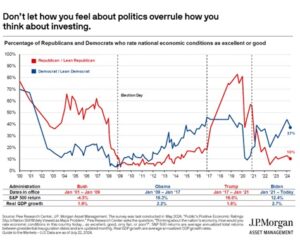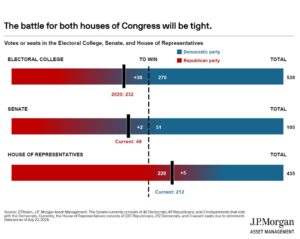
Shortly, we will know who our next president is, and which parties will control the House and the Senate. Until then, we can expect to hear constant messaging about what each side will do or not do and what will happen if the other side wins. Each side will tout the economic benefits if votes are cast for their team and forecast dire outcomes if cast for the others. The reality is the presidential election’s impact on your portfolio will be less than any of the candidates may lead you to believe.
Resist letting politics influence your investment decisions.
What should drive your financial strategy are your goals and how much financial market risk you are able and willing to take. The challenge is that our political preferences influence how we view our economic prospects.
JPMorgan recently updated their interesting research on how our politics influence our perception of the current business environment. They found that our political beliefs can significantly influence how we perceive the national economic conditions. The differences in perception are based on whether our political beliefs align with the party in the White House (see graph below).
In the graph, the blue line indicates those who are or lean Democrat, while the red line represents those who are or lean Republican. Republicans see the economy in a more positive light than Democrats during Republican administrations. The opposite is true when a Democrat is president. It’s important to note that these differences are based on perceptions, not reality. Democrats and Republicans live together, work together, and may even live in the same household. We are all part of the same economy, irrespective of how our politics color our views.
The information contained above is for illustrative purposes only
U.S. presidents do not directly influence either the stock market or the economy.
The chart included just below the graph above shows the returns of U.S. stocks (represented by the S&P 500 Index) and the growth of the U.S. economy (Real GDP growth). While this is a small sample of only the four recent presidents, it includes two Democratic and two Republican administrations. Two observations:
- Economic growth during the “blue” or “red” periods is similar. Differences are likely driven by a wide range of external events (banking crises, wars, pandemics) rather than any new policies implemented.
- Stock markets reflect the value of all future earnings of publicly traded companies, discounted based on risk. Market returns are impacted by long-term views well beyond the eight-year maximum of any one president.
Current and future presidents impact your emotional well-being, but they have less impact on your financial wealth.
Four factors likely influence investments more than who is in the White House:
1) Corporate earnings are more influenced by a company’s competitive position, the efforts of employees, and the value of its goods and services than the actions of the president. For example, while a U.S. president may choose to encourage certain energy sectors or promote a change to how healthcare is delivered and paid for, consumers may have different preferences.
2) Taxes and regulations: While a president may sign or veto legislation, changes to the tax code and many regulations are driven by Congress. Which party/parties will control the Senate and the House of Representatives is uncertain. The graph below, also from JPMorgan, highlights that November’s election could easily shift control of either or both.
The information contained above is for illustrative purposes only
3) Interest rates and inflation are managed primarily through monetary policies set by our central bank, the Federal Reserve. While presidents have always been tempted to influence decisions, the fact that we have an independent central bank is an attractive factor of our capital markets. It remains likely that the Fed will continue to rely on economic data rather than politics to drive decisions.
4) The global economy is complex. Foreign consumers buy our goods and services. We buy theirs. The past four years have reminded us of the complexity of global trade and supply chains. Very few goods are entirely created within our borders. Many services would be more expensive without workers from abroad. While we may wish that our president can control the global economy and its impact on our investment portfolios, they can’t.
Maintain your investment strategy based on your goals and how much financial market risk you are able and willing to take.
Keep politics and investing separate. Both are important. Who will be in the White House next year does matter, so please vote in November. But it will have less of an impact on your investment portfolio than perceived.

